ABOUT THE DEPARTMENT
The Department of IT was started in the year 1998. The department offers four year B.Tech Course with an intake of 120 Students. The department has distinguished, dedicated and specialized faculties in different areas of IT with rich experience in Academics, Industries and Research.
The Department has well-equipped and spacious laboratories with modern computer equipments. The department regularly conducts various seminars and workshops in emerging topics frequently. The campus area networking with round the clock internet connectivity is looked after by the department of IT. The faculty members of IT are engaged in various research projects in innovating the new technologies.
VISION
To bridge the gap between the academician and the Industry. To impart quality education through innovative teaching and learning method.
MISSION
To develop employable software developing graduates with knowledge, skills and ethics; provide them with the professional and soft skills necessary to lead a successful career.
PROGRAMMES OFFERED BY THE DEPARTMENT
The Department offered the following Courses
Bachelor of Technology in Information Technology (B.Tech-IT) started in 1998 with an intake of 120 Students.
PROGRAMME EDUCATIONAL OBJECTIVES (PEO)
| PEOs | PROGRAMME EDUCATIONAL OBJECTIVES |
|---|---|
| PEO1 | To ensure graduates will be proficient in utilizing the fundamental knowledge of basic sciences, mathematics and Information Technology for the applications relevant to various streams of Engineering and Technology. |
| PEO2 | To enrich graduates with the core competencies necessary for applying knowledge of computers and telecommunications equipment to store, retrieve, transmit, manipulate and analyze data in the context of business enterprise. |
| PEO3 | To enable graduates to think logically, pursue lifelong learning and will have the capacity to understand technical issues related to computing systems and to design optimal solutions. |
| PEO4 | To enable graduates to develop hardware and software systems by understanding the importance of social, business and environmental needs in the human context. |
| PEO5 | To enable graduates to gain employment in organizations and establish themselves as professionals by applying their technical skills to solve real world problems and meet the diversified needs of industry, academia and research. |
PROGRAMME OUTCOMES
ENGINEERING GRADUATES WILL BE ABLE TO:
| POs | PROGRAMME OUTCOMES |
|---|---|
| PO1 | Engineering knowledge: Apply the knowledge of mathematics, science, engineering fundamentals, and an engineering specialization to the solution of complex engineering problems. |
| PO2 | Problem analysis : Identify, formulate, review research literature, and analyze complex engineering problems reaching substantiated conclusions using first principles of mathematics, natural sciences, and engineering sciences. |
| PO3 | Design/development of solutions : Design solutions for complex engineering problems and design system components or processes that meet the specified needs with appropriate consideration for the public health and safety, and the cultural, societal, and environmental considerations. |
| PO4 | Conduct investigations of complex problems : Use research-based knowledge and research methods including design of experiments, analysis and interpretation of data, and synthesis of the information to provide valid conclusions. |
| PO5 | Modern tool usage : Create, select, and apply appropriate techniques, resources, and modern engineering and IT tools including prediction and modeling to complex engineering activities with an understanding of the limitations. |
| PO6 | The engineer and society : Apply reasoning informed by the contextual knowledge to assess societal, health, safety, legal and cultural issues and the consequent responsibilities relevant to the professional engineering practice. |
| PO7 | Environment and sustainability : Understand the impact of the professional engineering solutions in societal and environmental contexts, and demonstrate the knowledge of, and need for sustainable development. |
| PO8 | Ethics : Apply ethical principles and commit to professional ethics and responsibilities and norms of the engineering practice. |
| PO9 | Individual and team work : Function effectively as an individual, and as a member or leader in diverse teams, and in multidisciplinary settings. |
| PO10 | Communication: Communicate effectively on complex engineering activities with the engineering community and with society at large, such as, being able to comprehend and write effective reports and design documentation, make effective presentations, and give and receive clear instructions. |
| PO11 | Project management and finance : Demonstrate knowledge and understanding of the engineering and management principles and apply these to one’s own work, as a member and leader in a team, to manage projects and in multidisciplinary environments. |
| PO12 | Life-long learning: Recognize the need for, and have the preparation and ability to engage in independent and life-long learning in the broadest context of technological change. |
PROGRAM SPECIFIC OBJECTIVES (PSOs)
| PSOs | PROGRAM SPECIFIC OBJECTIVES |
|---|---|
| PSO1 | To create, select, and apply appropriate techniques, resources, modern engineering and IT tools including prediction and modelling to complex engineering activities with an understanding of the limitations. |
| PSO2 | To manage complex IT projects with consideration of the human, financial, ethical and environmental factors and an understanding of risk management processes, and operational and policy implications. |



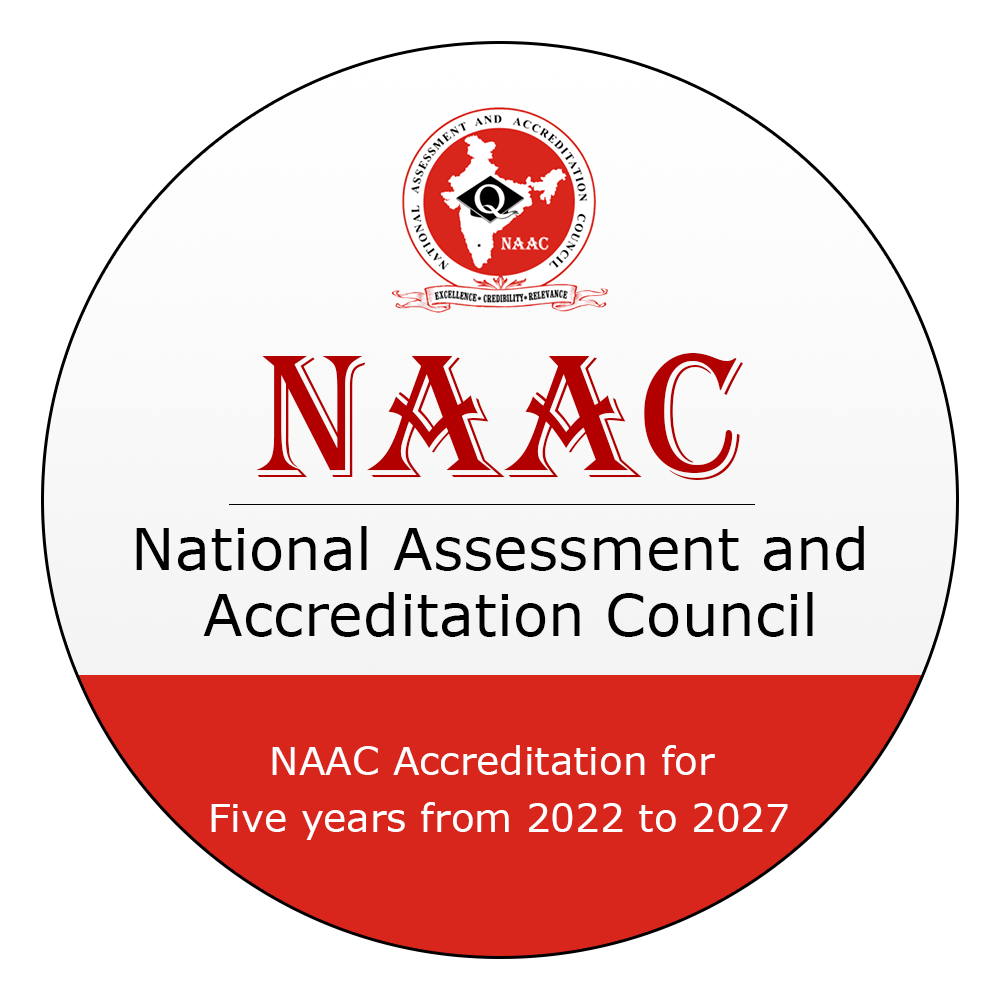
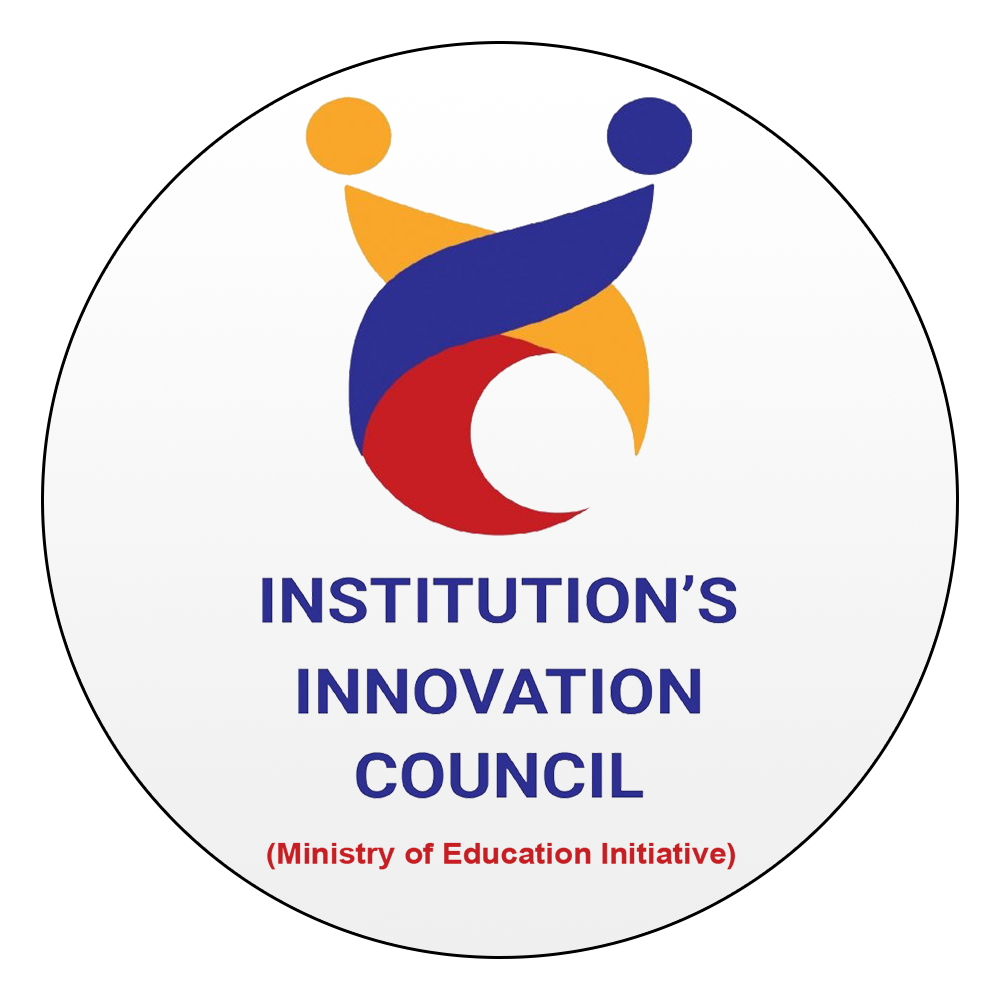
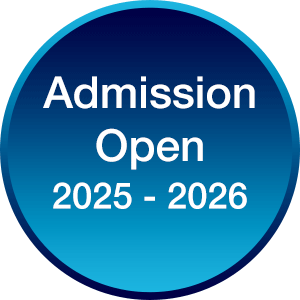

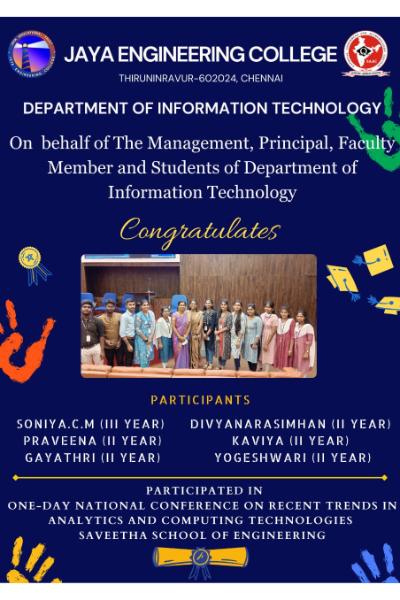
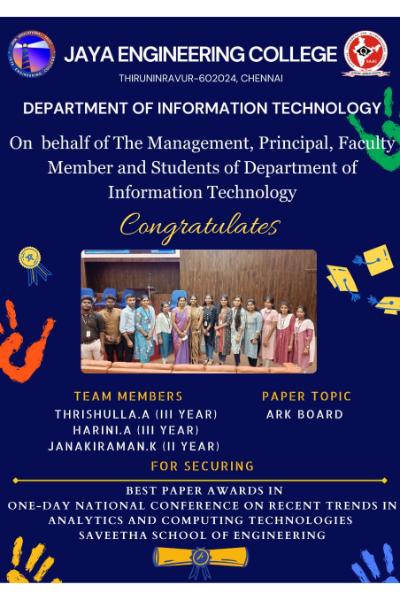
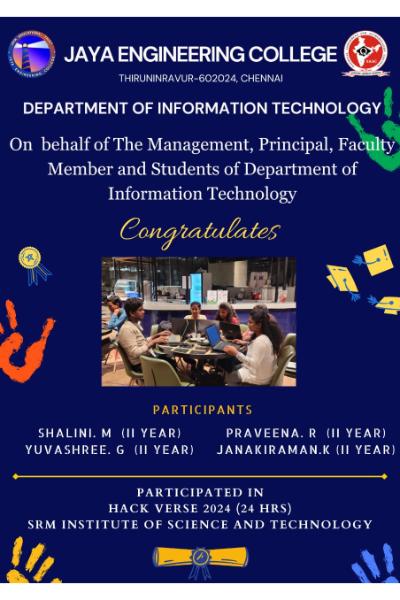
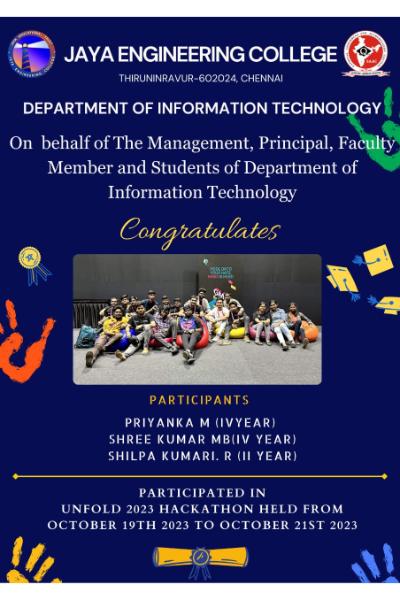
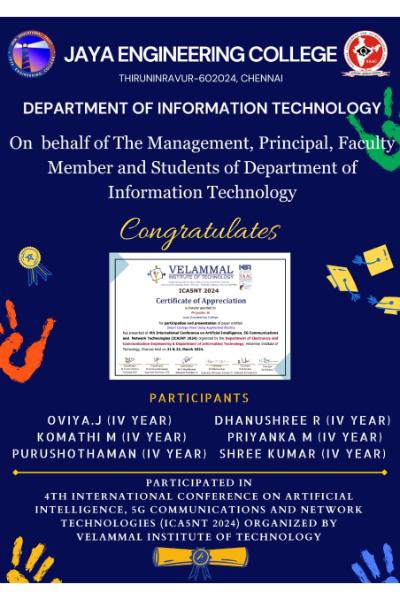
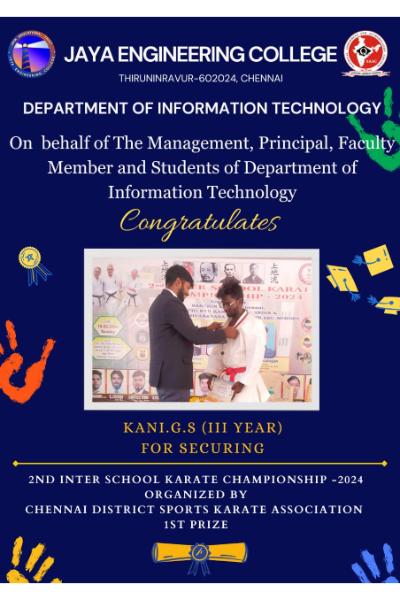
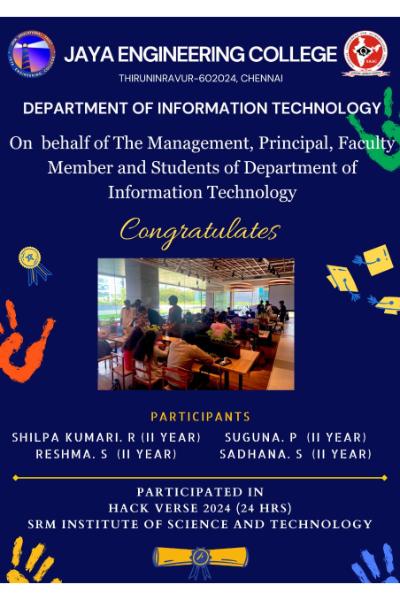
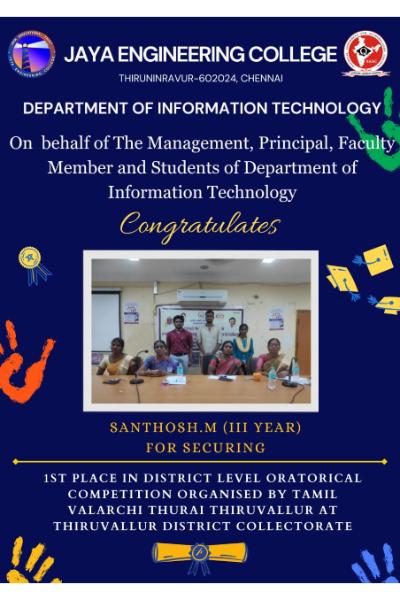
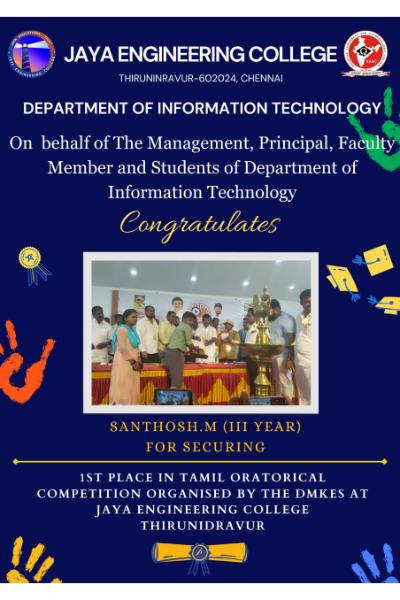
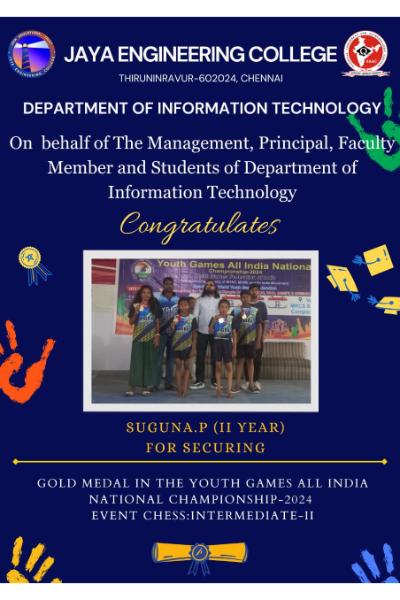
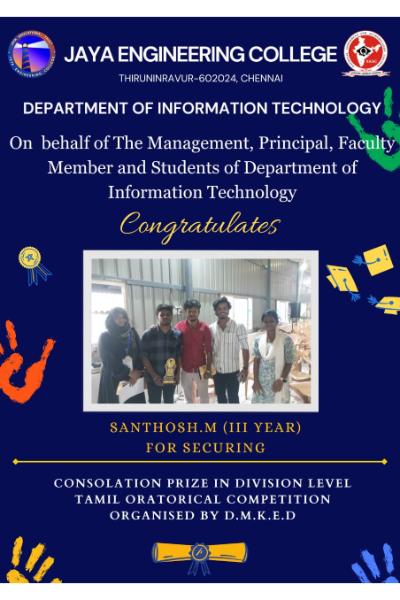
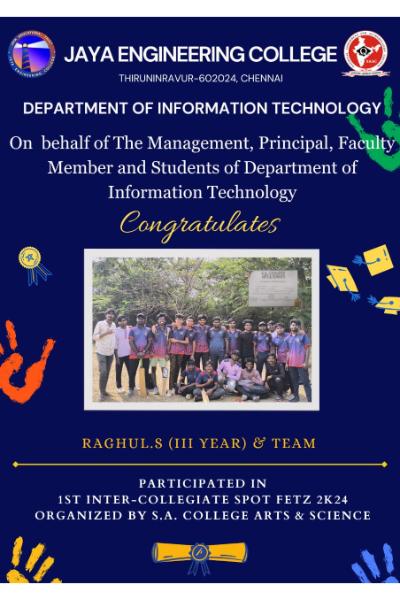
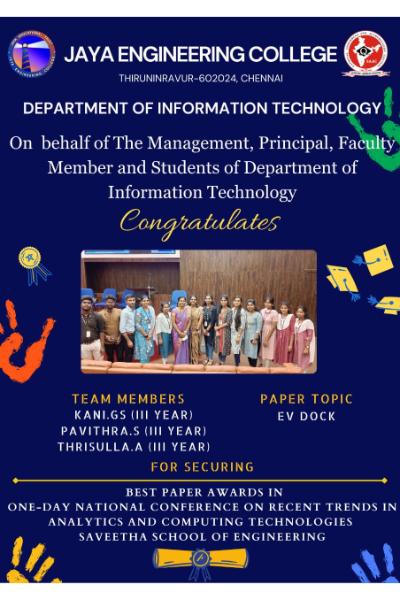
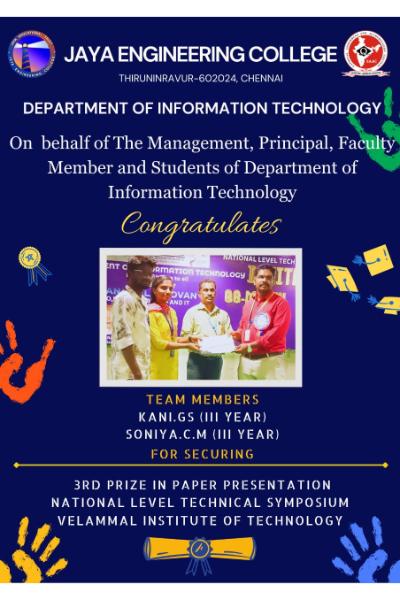


For Online Grievance : onlinegrievance@jec.ac.in